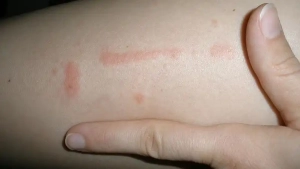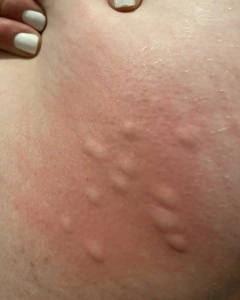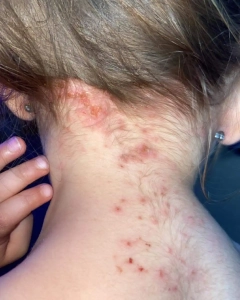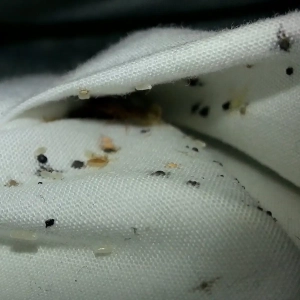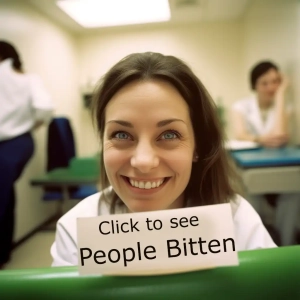How to Identify, Treat, and Prevent Bed Bug Bites
Bed bug bites suck, but we’ll show you how to manage the symptoms and prevent future bites.
Bed bugs bite exposed areas of the skin, but they can also bite other parts of the body if those areas come in contact with infested bedding or furniture.
Identifying Bed Bug Bites
The first step is identifying bed bug bites, which can be challenging because their symptoms often resemble other insect bites, such as mosquitoes or fleas. Some telltale signs you have been bitten by them are:
Bed bug bite pattern:
Bed bugs often bite in groups or rows of three or more. The bites may be in a zigzag pattern or in a line as shown on the skin in the picture above.
This is a good indicator you were bitten by these pests. Want to see more pictures of bites in a line?
Bed bug welts:
Bed bug welts can be red and itchy and look like mosquito bites as shown in the picture above. Although they can appear anywhere, they are usually found on the face, neck, arms, and hands.
Bed bug rash:
Scratching a rash like this can lead to infection as shown in picture above. Want to see more pictures of bedbug bites causing a rash?
Presence of bed bugs:
If you see live bed bugs, their sticky rice like eggs or their shed skins as in the photo above, any bites you have are likely from bed bugs.
Bed bug excrement: Bed bugs leave behind small black or brown fecal spots (droppings) on mattresses, sheets, pillowcases, mattresses, or other areas of your bedding. If you see these spots as shown above, it’s a sign that bed bugs may exist in your home.
Check out our bed bug infestations for more pictures.
Bed bugs feed for 5-15 minutes once a week after midnight while you are sleeping. They find you from the carbon dioxide you breath out, your body warmth, and your body odor.
Delayed reaction:
Bed bug bites may take a few days to a week to develop, so you may not notice them immediately.
Skin reactions:
Some people may have a more severe reaction to bed bug bites than others. In some cases, bites may cause blisters or hives or may lead to an allergic reaction.
*If you react severely to bites, seek medical attention immediately.
If you’re interested, check out our amazing photos of bed bug bites on various people.
Treatment for Bed Bug Bites
Home Remedies
Suppose you’re experiencing itchiness and discomfort from bed bug bites. In that case, there are several home remedies you can try to alleviate the symptoms:
- Cold compress: You can reduce swelling by applying a cold compress to help reduce itching and inflammation.
- Baking soda paste: Mixing baking soda and water to form a paste and applying it to the bites can also help soothe the itchiness.
- Make sure to wash the bed bug bites with soap and water.
- Make a thick, sticky paste with the water and baking soda, not too runny and thick enough that it will stay.
- Let the paste stand until completely dry, and then wait an hour or so. Some let it stand for hours, while others find that an hour or less is effective.
- Gently wash the paste off and pat dry.
- Aloe vera gel: Aloe vera has natural anti-inflammatory properties, which can provide relief when applied directly to the bites. Just trim a tip and apply the exposed area to the bite.
- Oatmeal bath: Soaking in an oatmeal bath may help alleviate itching and soothe the skin.
- Witch hazel, St. John’s Wort, and Lemon juice all work by removing the desire to itch (Astringents).
- Handed down from generations is a bath with a half cup of peppermint oil to relieve the itching.
- Claude suggested a “hot as you can stand it” shower or bath to treat the bites. The itching will intensify for a few seconds, but the relief lasts for many hours. Some believe the heat from the water overloads the ends of your nerves and prevents them from telling your brain to itch. Some think the heat causes your body to release more histamine than usual, thereby less histamine around the bite. Whatever the reason, it’s commonly used as a solution to itching caused by bites.
- Lemon juice on a wad of tissue placed lightly over the swollen area to reduce itching.
- Sam uses crotamiton creme followed by lotrix creme for 15 days.
Again, please resist the urge to scratch the bites, which can lead to infection and scarring.
We have an entire page of visitors discussing bed bug relief using home remedies if you want to learn more.
Over-the-Counter Treatments
There are also over-the-counter treatments available to help manage the symptoms of bed bug bites:
- Antihistamines: Oral antihistamines, like Benadryl, can help reduce the itching and swelling caused by the bites.
- Topical creams: Corticosteroid creams or ointments can be applied to the bites to reduce inflammation and itching.
What Doctors Prescribed for our Visitor’s Bites
In Richard’s case, the itching was so bad that he ended up at Kaiser Permanente Hospital in Urgent Care, where the doctors prescribed Calamine Topical Suspension USP, Cephalexin, and Hydroxyzine HCL for the bed bugs bites.
- Calamine helps to keep the bite area from oozing
- Cephalexin helps with bacteria of the infection bit
- Hydroxyzine helps with the itching that some people experience after being bitten.
Rachel had a doctor prescribe her betamethasone valerate to relieve the itching. She says it works but doesn’t get rid of the bites.
 Bridget’s Dr. prescribed a topical cortisone cream to stop the itching and told him that diphenhydramine (Benadryl) would halt the itching too.
Bridget’s Dr. prescribed a topical cortisone cream to stop the itching and told him that diphenhydramine (Benadryl) would halt the itching too.
Julie’s Doctor suggested using tea tree oil as a repellent and fucidin H on the spots. He suggested that I should spray everything with bed bug dust, even the mattresses.
Rob’s Doctor prescribed locoid lipocream and found it to be most effective. He tried a sample of foaming medication in a small can which didn’t seem to work. He treated his swollen bites 3x the first day with the lipocream, and by morning it was 100x better with significantly reduced redness and swelling.
When to See a Doctor
In most cases, bed bug bites can be treated at home. However, if you experience any of the following symptoms, it’s essential to seek medical attention:
- Signs of infection: If the bite area becomes red, swollen, and warm to the touch, or if you develop a fever, you may have an infection.
- Severe allergic reactions: trouble breathing, tightness in your chest, or swelling of the face or tongue may indicate an allergic reaction, and you need to seek immediate medical help.
- You are concerned your situation may be getting worse.
- You are experiencing depression or other emotions symptoms.
Emotional Symptoms from Bites

Woman showing emotional symptoms of dealing with bites.
Being bitten by bed bugs can be an unsettling experience, leading to various emotional symptoms, and it’s completely normal to feel this way! However, people react differently to these situations and can include:
- Anxiety: It’s natural to feel anxious when dealing with bed bugs, as they can make your personal space feel invaded and unsafe. The thought of bed bugs can make it difficult to relax, causing anxiety levels to rise.
- Stress: Dealing with bed bug infestations can be very stressful, as it may involve cleaning, laundering, and seeking professional help to eliminate the pests. This added stress can exacerbate any feelings of discomfort or unease.
- Sleeplessness: Worries about bed bugs might make it hard for you to sleep, leading to sleep deprivation and further emotional distress.
- Embarrassment: Some people might feel embarrassed about bed bugs, thinking it’s a sign of uncleanliness or poor hygiene. Please know that bed bugs can infest even the cleanest of environments (even hospitals), and it does not reflect your cleanliness or character.
- Frustration: Dealing with bed bug bites and infestations can be a long and frustrating process, which can take an emotional toll as you work to resolve the issue.
- Fear: Some individuals may develop a fear of being bitten again, making them hyper-aware of their surroundings and hesitant to sleep in unfamiliar environments. This fear can manifest as checking bedding, furniture, and luggage, especially when traveling or staying in hotels.
- Helplessness: Dealing with a bed bug infestation might leave you feeling helpless if the situation is not improving despite your best efforts. This can be emotionally draining and may affect your overall well-being.
- Depression: In some cases, the combination of anxiety, stress, sleeplessness, and other emotional symptoms may lead to feelings of sadness or depression.
Beth Shares Her Depression from Bed Bug Bites
Beth M::
Do these bites make anyone else hopeless and suicidal? Even after countless treatments of our beds and linens every morning, I wake up with 20-30 new bites. I react extremely strongly to them, they can swell as big as a half dollar, and they itch sO badly that I often rip them open, leaving them prone to infection.
I’m now diagnosed as anemic, which the Doctor is sure is because of the number of bites…they are eating me alive…and killing me.
My husband and I have shared parenting with our exes. His ex won’t let the kids come home anymore because they get bitten. This morning I looked over at my daughter, and she was covered in red welts – I counted 30 on her back alone! – and I had to send her to her dads because, in good conscience, I can’t let them eat her too.
I know when you get infested with these, the bedding and mattresses all have to go. We are barely scraping by as it is, and we have a bed for each kid no matter how often they come to see us – including ours; that’s SEVEN mattresses and bedding sets.
Our landlord is not returning our calls, and although I know that he is responsible for not treating the problem, which (per neighbor reports) the previous tenants had, too. But the lawyer wants $500 to even send a LETTER, let alone go to court. And I keep thinking that even if we go to court and win, the courts will make him treat the apartment…not replace its furniture.
So…we sleep on floors with newspapers? I don’t get to see our kids; I can’t protect them from the little monsters; my own body is being eaten alive; the constant itching and scratching are embarrassing, as is the fact that I have bites and scars in visible places and that my blood no longer clots properly, so if I get a paper cut, I’ll be bleeding a good half hour.
We’ve sprayed, washed, and dried, and the bites keep coming; I’ve used prescription-strength cortisone cream, Benadryl (which makes me tired and stupid at work), Zyrtec, Aveeno shower soap, and even used my DOGS anti-itch shampoo.
And I am still itching till they bleed, scarring, and finding new ones every day.
I just…a part of me has lost hope that there will be an escape, and I’m so depressed I just want to go to sleep and not wake up. I wondered if you all felt hopeless too, and how did you cope?
Remember, experiencing these emotional symptoms after bed bug bites is a natural response; you are not alone in feeling this way. It’s crucial to address the infestation as soon as possible and take care of your emotional well-being during this challenging time. If you’re feeling depressed, see your doctor or mental health professional as soon as possible. Talk to a loved one, friend, health care professional, faith leader, or someone you trust if you’re reluctant to seek treatment.
Know that overcoming an infestation and restoring your peace of mind is possible. See our page on how to get rid of bed bugs.
